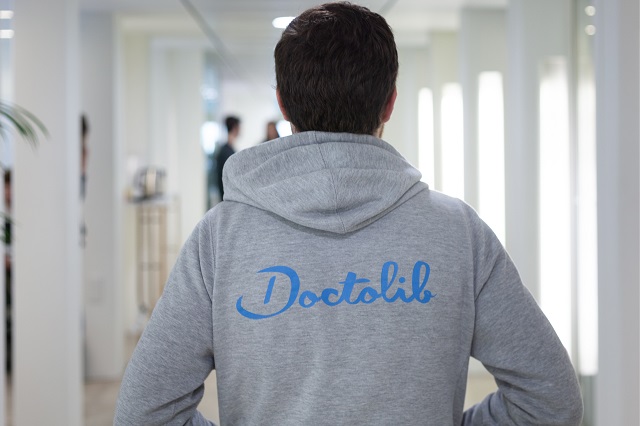One evening in July, following an announcement from the French Government, 1.3 million people went online to make an appointment to get the COVID vaccine. They all went to one site.
Doctolib.
Doctolib is one of the biggest French scaleups. A healthcare technology company, Doctolib offers convenient online appointment booking and video consultations, among other services. Over 300,000 healthcare professionals and 60 million patients in France, Germany, and Italy currently use the service and the numbers just keep increasing.
Doctolib is experiencing massive growth and the CEO has announced a plan to hire 1000 people in the next year. Many of these will be tech profiles due to the online nature of the business.

“We’re rapidly expanding our technical teams as we continue using technology to radically enhance the day-to-day lives of healthcare professionals and patients. To reach our missions, we rely on the strength of our Engineering team, which is building the technology that supports this transformation”
David Lambert, Engineering Director at Doctolib.
We spoke to Kristi Edleson, who leads the global engineering recruiting team, about the evolution of the tech profile recruiting process in this rapidly expanding company.
“We’re constantly trying to improve the level of engineers that we’re hiring, bring in more senior talent, and do it more efficiently.” The rapid growth means Edleson’s team needs to be very agile.
To achieve their ambitious recruitment goals, Doctolib will be using CodinGame, first-class candidate assessment platform and CoderPad, the market’s leading technical interview solution.
David Lambert explains that CoderPad and CodinGame will “make it possible for us to find the best possible candidates and evaluate them fairly with an engaging interview experience that’s congruent with our key value: user first.”
With CodinGame, Doctolib will be able to assess their candidates by getting them to solve real-life programming problems. Recruiters can tap into a pool of 3500+ coding challenges across 60+ technologies and frameworks with content suited to different levels of experience.
CoderPad will allow them to conduct collaborative interviews by developers to write, execute and debug code as part of a collaborative, online interview – all in a performant, shared, browser-based environment.
Thinking outside the stack
At Doctolib engineers use Ruby and React but they don’t require all candidates to be experts in their stack. Instead their job ads state that they “believe that technology should serve the product” and that it’s more important to recruit people who are sensitive to product and users, share a pragmatic vision of coding, and who want to learn from and teach others. They have an in depth onboarding process for new developers, including tech camps, pair programming, and mentoring. Everything necessary to get everyone up to speed to be happy and productive team members.
Until now, Doctolib has used a home assignment containing real challenges that an engineer would encounter in a day working there. This test has received “a lot of praise from candidates”, and people feel “more engaged” after completing it. Candidates complete the test in JavaScript or Ruby. While many developers will have some proficiency in these languages, Edleson acknowledges that “not everybody is an expert in one of those and some don’t feel like they can really share their skills in the proper way”.
“I’m going to do it in C++”
What if you were a perfectionist who wanted to show off your abilities but you knew that your JavaScript skills were just not as good as your skills in another language? In this situation, Edleson reassures candidates they’re not going to be graded on the syntax. Even with such reassurances it can be difficult for a high achiever to feel comfortable.
This happened with a candidate who said “I don’t know JavaScript, I don’t know Ruby but I’m an expert in C++ so I’m going to do it in C++.” Edleson had a good feeling about the candidate and responded “That’s fine. We’ve never done this before but I will find someone internally to grade this test and we’ll make it happen.”
She did and the developer works at Doctolib today and is an exceptionally strong member of the team. Everyone is very happy that they were flexible enough with the assessment to not miss out on a great engineer.
“We’re really looking forward to the flexibility of CodinGame.”
For Edleson, it’s important to not be too restrictive early in the recruiting process. “If we’re not requiring a certain language fluency, then we have to make sure that at least at the top of the funnel, we’re being quite open in terms of who we’re letting in”.
Giving candidates the possibility to show their skills even if they don’t master certain languages is key to keeping the top of the funnel open to not miss out on great talent. With CodinGame, Doctolib will have the option to customise tests to have the personal Doctolib touch and to even include language-independent questions.
CodinGame has the advantage of giving not only a global test score and a comparison to all people who’ve taken the test before but also a skill breakdown in the form of a report. Candidates are assessed on language knowledge but also problem solving skills, code reliability, and design. This gives a nuanced view and fits perfectly with Doctolib’s search for developers who “share a pragmatic view of coding”.
“We’re really looking forward to the flexibility of CodinGame.”
Saving the engineering team, recruiters and candidates time
Another drawback to the home assignment is it requires 30 minutes out of a developer’s day to grade. This has meant that Edleson’s team needs a workflow to load balance grading across engineers. It can be difficult to predict when the engineer will have time to complete the grading, which can complicate things when there’s an urgent case. The combination of needing to find people to grade and engineers needing to find time to grade means it can become a “huge time suck for everybody”.
The test is also quite lengthy for candidates. In some cases, candidates are not convinced they’re ready to interview and in these situations, Edleson acknowledges “it’s really hard to say, ‘okay, now go do this homework for several hours’ versus being able to do something quicker.”Edleson estimates that they miss out on 25-30% of candidates who could be relevant for them but choose not to do the assignments. With CodinGame, it will be easy for recruiters to vary the length of tests in the goal of improving completion rates.

A clean, consistent tool for remote interviews
Like many companies, Doctolib has expanded remote work and now there are certain teams, such as tech, which can be fully remote. For recruiter, Edleson, this is a positive as it has “opened up talent pools”. This means it is now common for interviews to be held at a distance, which can pose some challenges.
Doctolib has relied on Google Meet to conduct remote interviews, asking candidates to set up their own dev environments and screen share. Issues arise when candidates don’t understand or forget they need to have their environment prepared in advance. Candidates interviewing remotely often squeeze interviews into their schedules and may use a different computer without access to their usual coding environment. When this has happened, “they either went ahead with the interview and it didn’t go well, or we just had to reschedule it.”
Replacing Google Meet with CoderPad will mean this problem is a thing of the past. With browser-based CoderPad, candidates access an online IDE (integrated development environment), providing interviewees with the space and comfort they need to do their best work. The coding is recorded and interviewers can code together with the candidate if they want to make the experience more collaborative.
The CoderPad experience is also designed to be less stressful than a traditional interview with the focus time feature, which allows candidates to work on a problem without being watched by the interviewer (although the code is available for playback later). The playback feature also means that team members can watch the coding later to have insight into the candidate, without the need for a stressful panel interview. Everything needed to accurately assess skills while reducing interview stress and maintaining the human touch.
“I’m super looking forward to having a very clean tool that is consistent and being able to capture and go back to the information in there”.
Kristi Edleson
Keeping the human touch
At Doctolib, providing a great candidate experience is important. Edleson explains it’s checks and balances as she navigates whether focus should be on making the assessment quite engaging and giving a sense of the company or if it is better to save time for candidates and recruiters.
As the process evolves, Edleson is determined to keep the human touch. One consideration is thus where to place assessment in the process. For Edleson, the assessment should “not be a barrier to entry but rather a check mark along the way.” Assessment will be balanced with touch points throughout the process and there will be a “focus on being able to identify high potential earlier in the process and getting them engaged directly with the manager”.
Doctolib will keep the human touch while improving efficiency to identify the best fitting profiles for the company’s mission and culture. It’s a process which is constantly being refined as the company continues to rapidly recruit.
Next steps
Doctolib will start integrating CodinGame and CoderPad into their engineer recruitment processes as they strive to keep their processes efficient whilst keeping the human touch. Stay tuned for our next installment in a few months when we will check back in and see how the Doctolib tech hiring process has evolved with the introduction of CodinGame and CoderPad.

